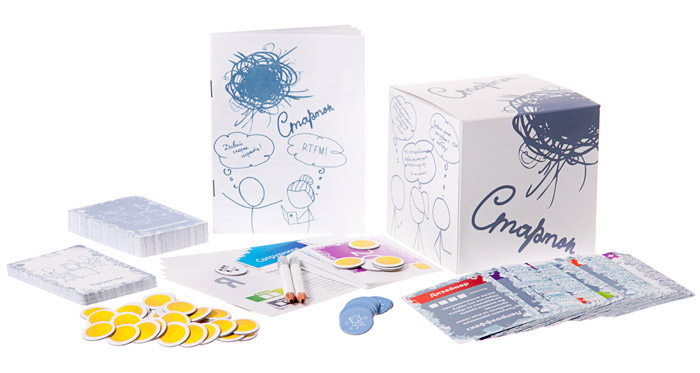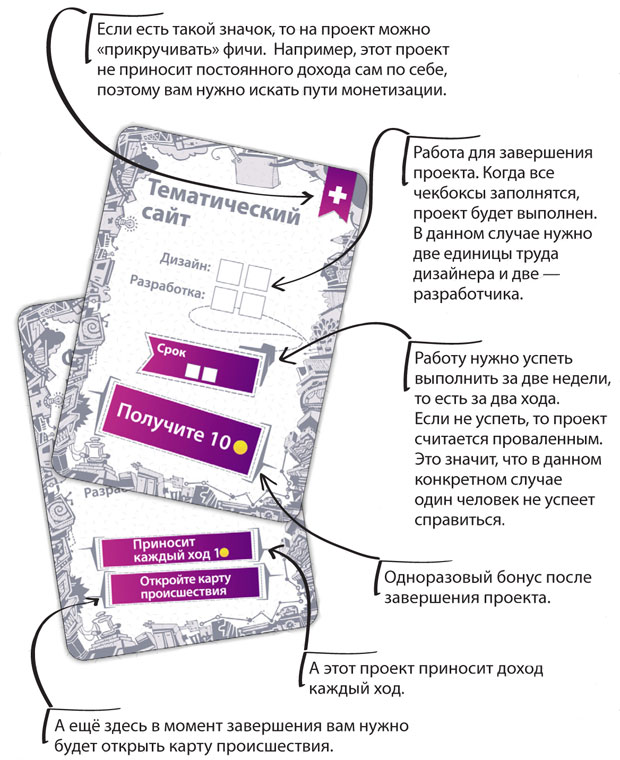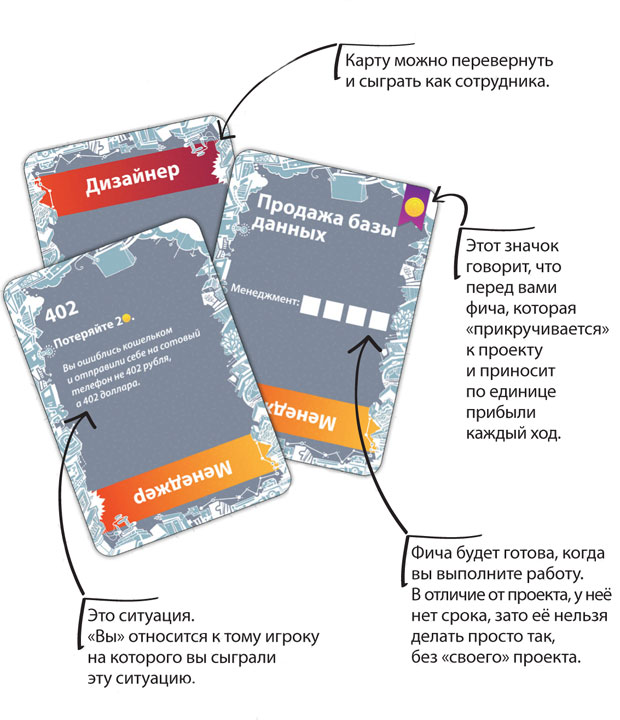Habraigra "Startup"
Last week, Mosigra shipped the first 20 boxes of the Startup game to Habra, which we sawed together for more than three months. This is a game about small business, IT-projects, the ability to negotiate, plan time, evaluate your strength and solve various problems together.
This is what we wanted from the board game:

')
Very simple: I went to one of Habr's seminars in the summer, and then we agreed on a joint release. The remaining 3 and a half months we have been developing.
Each player receives 10 coins and six cards: three projects and three possibilities. The project map looks like this:

This is your idea, which after a certain amount of work turns into a project that lives its own life. To make specifically this one in the picture you will need two units of designer work and two units of developer work. Considering the period of two weeks (two moves), you need not only to work yourself, but also to attract at least one more employee in order to have time to do the project. By the way, each individual employee can work only in his own direction, but here you are - in any direction. This is very convenient in the early stages when you need to be a jack of all trades.
The finished project either gives you a lot of money at once, or brings a steady income every turn. It happens that the project is bad (for example, you made a phishing site) - then you get a good blow to the karma in the form of an extraordinary map of the facial.
Each opportunity card represents the idea of a feature or situation on the one hand and an employee on the other. So they look like this:

As soon as you start your first project, you need to either start negotiating with other players about working together (a classic of the genre: three students in the garage) and sharing profits, or hiring your employees. The joy is that if you hire an employee, you will forever lose the opportunity to use the second side of the opportunity card - and, accordingly, if you use a situation or feature, you will lose the chance to hire an employee. And good shots are a very rare occurrence.
A hired employee begins to regularly produce one unit of his work per turn and eat your budget, one by one per turn. At some point, it will almost certainly stand idle - but still eat your money. There is an option to dismiss him (and not find a replacement later) or try to sell his work, playing in an outsourcing company.
At the moment there are 3 basic strategies that are used by players without prompts and 2 more interesting.
Clearly, everything is done according to the situation: these are not tough options, but simply the characters of the game of different players.
Oh, this is the third kind of map, like this:

This is a whole song. Here the anthology of our clinical rake is collected, moreover crowded from here, from Habra. Here is a question in Q & A : there is a corresponding card for almost every answer in the topic (by the way, if you participated in this, write to the PM, I’m happy to give you a code for a special discount).
Fakapy happen every turn, sometimes - more often. Fakapy are of two types: where you can pay off and where you need to work out. Which about work out are similar to projects: you need to make work, and there will be no problem.
Those fakapy, where you can buy off, act as follows: for example, each player must lose 2 coins by the condition of the card - or you can buy off for 2 coins. It is clear that with two players at the table, it is advantageous to give a coin and not lose anything. It’s harder when there are three or four players, because there are no fractional coins. More joy is added by the fact that everything is done closed up: players take coins (or pretend to take) into fists and empty them on the table at the same time. If you have accumulated on the "something" - phacap does not occur. If it doesn’t work out - oops, it doesn’t happen, all the discarded ones are lost, and the problem itself will work. Here it is necessary to understand what is beneficial to whom and to take appropriate decisions. And yes, this is a good game moment: when you need to find 5 coins, everyone folds one by one, and the last player shows an empty palm - this is a whole sea of emotions. When someone throws one 3, and the rest shrug - too. Bluff and calculation rule.
Diplomacy is the most beautiful part of the game. It allows almost everything except the transfer of employees and cards. This is the free and most needed part of “Startup”: on it we train to be logical, convincing and competently carry out negotiations. It is worth trying to play a couple of times to see how wonderful and unusual you can use this engine.
- More team - more office costs.
- At first, you get paid, then you stop.
- Each turn opens a new project that may or may not be taken into operation.
- You can sell ideas and not implement them.
- Constantly something burns and something goes wrong, so you need to negotiate a lot and often.
- The game is made "under overclocking", so there is a supply of money on top of the ones needed in a normal game.
- You can mix two editions and play a large company.
The rules can be viewed here ( PDF , 5 Mb) or on the page of the game in Mosigra . There are also photos of what lies inside the box.
Composition:
In general, the thing turned out to be very interesting and with a very, very unusual production. Habrakomanda already playing with might and main.
Well, yes, you can buy it here . Important : while the game is only in Moscow and St. Petersburg. If you want it to reach you faster, you should create a pre-order (it does not oblige you to anything) simply by writing a letter to sales@mosigra.ru with a contact and a city. Mosigra exists almost throughout Russia (even in Yuzhno-Sakhalinsk), in Ukraine, Belarus, and Kazakhstan.
UPD: in a week or two there will be a detailed topic with a description of the entire development.
UPD: here it is .
This is what we wanted from the board game:
- Finally make something about IT.
- And about your business.
- The game should be a coaching negotiating skills and illustrating project management.
- You can start playing in 2 minutes, but look for nuances for a long time.
- Without a 100% winning strategy, each time according to the situation.
- Without cubes and hell of a random.
- With a bit of black humor and local memes.

')
How did the idea come?
Very simple: I went to one of Habr's seminars in the summer, and then we agreed on a joint release. The remaining 3 and a half months we have been developing.
How to play it?
Each player receives 10 coins and six cards: three projects and three possibilities. The project map looks like this:

This is your idea, which after a certain amount of work turns into a project that lives its own life. To make specifically this one in the picture you will need two units of designer work and two units of developer work. Considering the period of two weeks (two moves), you need not only to work yourself, but also to attract at least one more employee in order to have time to do the project. By the way, each individual employee can work only in his own direction, but here you are - in any direction. This is very convenient in the early stages when you need to be a jack of all trades.
The finished project either gives you a lot of money at once, or brings a steady income every turn. It happens that the project is bad (for example, you made a phishing site) - then you get a good blow to the karma in the form of an extraordinary map of the facial.
Where is my team?
Each opportunity card represents the idea of a feature or situation on the one hand and an employee on the other. So they look like this:

As soon as you start your first project, you need to either start negotiating with other players about working together (a classic of the genre: three students in the garage) and sharing profits, or hiring your employees. The joy is that if you hire an employee, you will forever lose the opportunity to use the second side of the opportunity card - and, accordingly, if you use a situation or feature, you will lose the chance to hire an employee. And good shots are a very rare occurrence.
A hired employee begins to regularly produce one unit of his work per turn and eat your budget, one by one per turn. At some point, it will almost certainly stand idle - but still eat your money. There is an option to dismiss him (and not find a replacement later) or try to sell his work, playing in an outsourcing company.
Strategies
At the moment there are 3 basic strategies that are used by players without prompts and 2 more interesting.
- “ All by myself ” is when you work for your uncle and get paid, and in the evening you are slowly doing your project. There is no risk, but almost no profit, plus not all projects can be done in one person. This is an intuitive strategy.
- “ A pack of comrades ” is when you negotiate with your friends and do everything together (and then you quarrel at the moment of the division of profits, but you still have to find out).
- " Investor " - you hire people and quickly start an expensive project. Lots of profit, fast, but high risks of losing everything.
- " Outsourcing " - the first non-basic strategy. You are building a company that sells work services to other businessmen. It is highly demanded on the first moves and at the moments when someone has something on fire due to fakaps.
- “ Crisis Manager ” - you invest in the possibility of harming players and begin to actively pit them, receive orders for different jobs, support allies, etc., making a profit.
Clearly, everything is done according to the situation: these are not tough options, but simply the characters of the game of different players.
Stop-stop, but what about fakapy?
Oh, this is the third kind of map, like this:

This is a whole song. Here the anthology of our clinical rake is collected, moreover crowded from here, from Habra. Here is a question in Q & A : there is a corresponding card for almost every answer in the topic (by the way, if you participated in this, write to the PM, I’m happy to give you a code for a special discount).
Fakapy happen every turn, sometimes - more often. Fakapy are of two types: where you can pay off and where you need to work out. Which about work out are similar to projects: you need to make work, and there will be no problem.
Those fakapy, where you can buy off, act as follows: for example, each player must lose 2 coins by the condition of the card - or you can buy off for 2 coins. It is clear that with two players at the table, it is advantageous to give a coin and not lose anything. It’s harder when there are three or four players, because there are no fractional coins. More joy is added by the fact that everything is done closed up: players take coins (or pretend to take) into fists and empty them on the table at the same time. If you have accumulated on the "something" - phacap does not occur. If it doesn’t work out - oops, it doesn’t happen, all the discarded ones are lost, and the problem itself will work. Here it is necessary to understand what is beneficial to whom and to take appropriate decisions. And yes, this is a good game moment: when you need to find 5 coins, everyone folds one by one, and the last player shows an empty palm - this is a whole sea of emotions. When someone throws one 3, and the rest shrug - too. Bluff and calculation rule.
About diplomacy
Diplomacy is the most beautiful part of the game. It allows almost everything except the transfer of employees and cards. This is the free and most needed part of “Startup”: on it we train to be logical, convincing and competently carry out negotiations. It is worth trying to play a couple of times to see how wonderful and unusual you can use this engine.
More features of the game:
- More team - more office costs.
- At first, you get paid, then you stop.
- Each turn opens a new project that may or may not be taken into operation.
- You can sell ideas and not implement them.
- Constantly something burns and something goes wrong, so you need to negotiate a lot and often.
- The game is made "under overclocking", so there is a supply of money on top of the ones needed in a normal game.
- You can mix two editions and play a large company.
Rules and composition
The rules can be viewed here ( PDF , 5 Mb) or on the page of the game in Mosigra . There are also photos of what lies inside the box.
Composition:
- 27 cards of projects . They determine the main ways of development of the players and at the same time serve as a game timer: when projects run out, the game will end too.
- 50 cards of opportunity . These are staff, features and tricks. Skillful use of these cards is the key to victory and prosperity.
- 42 maps of the incident . Do not ask why they are so much. And yes, for sure you will find among them at least a couple of perfectly familiar situations. The general meaning of these cards is that there are those who do not backup and those who already do.
- 50 coins from a dense cardboard. The pictures are similar to those coins that were in the game about the brothers-plumbers.
- Denominations : 5 to 20 units and 10 to 10 units. In ordinary life rarely needed.
- 9 chips unsuccessful projects.
- Active player marker (glider).
- 5 cards "I" .
- 2 pencils with an eraser.
- Instructions .
In general, the thing turned out to be very interesting and with a very, very unusual production. Habrakomanda already playing with might and main.
Well, yes, you can buy it here . Important : while the game is only in Moscow and St. Petersburg. If you want it to reach you faster, you should create a pre-order (it does not oblige you to anything) simply by writing a letter to sales@mosigra.ru with a contact and a city. Mosigra exists almost throughout Russia (even in Yuzhno-Sakhalinsk), in Ukraine, Belarus, and Kazakhstan.
UPD: in a week or two there will be a detailed topic with a description of the entire development.
UPD: here it is .
Source: https://habr.com/ru/post/135373/
All Articles